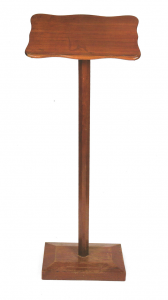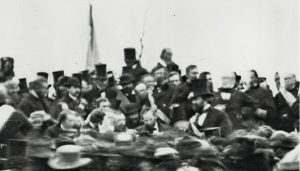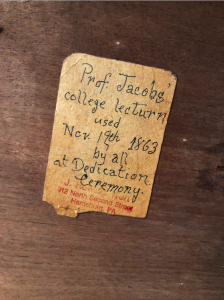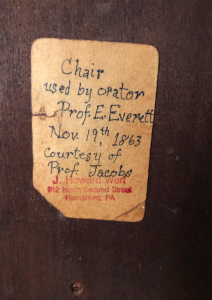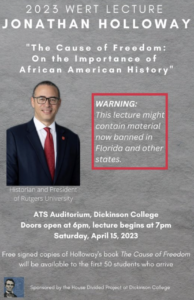 On Saturday evening, April 15, 2023, Rutgers University president and noted historian Jonathan Holloway will deliver the annual J. Howard Wert Lecture from the lectern that was on the speaker’s platform on November 19, 1863 when Abraham Lincoln delivered the Gettysburg Address. Holloway will speak about “The Cause of Freedom: On the Importance of African American History.” This event is free and open to the public and will be held at the Anita Tuvin Schlecter (ATS) auditorium (campus map). Doors open at 6pm for those who would like to view the lectern and other rare artifacts from the Gettysburg battlefield and African American history. Holloway’s lecture begins at 7pm and will continue until 8pm with a book signing to follow. The first 50 students who arrive will receive free, signed copies of Holloway’s book, The Cause of Freedom (Oxford, 2021).
On Saturday evening, April 15, 2023, Rutgers University president and noted historian Jonathan Holloway will deliver the annual J. Howard Wert Lecture from the lectern that was on the speaker’s platform on November 19, 1863 when Abraham Lincoln delivered the Gettysburg Address. Holloway will speak about “The Cause of Freedom: On the Importance of African American History.” This event is free and open to the public and will be held at the Anita Tuvin Schlecter (ATS) auditorium (campus map). Doors open at 6pm for those who would like to view the lectern and other rare artifacts from the Gettysburg battlefield and African American history. Holloway’s lecture begins at 7pm and will continue until 8pm with a book signing to follow. The first 50 students who arrive will receive free, signed copies of Holloway’s book, The Cause of Freedom (Oxford, 2021).
High school students participating in Dickinson’s innovative Knowledge for Freedom summer seminar will also be receiving free signed copies of Holloway’s book. The Knowledge for Freedom program is designed especially to help get low-income or first-generation college students ready for college. From July 16-28, 2023, up to three dozen rising high school seniors from around the region will be participating on campus in this free residential experience that includes field trips to Gettysburg and Washington, DC. The Cause of Freedom will be one of the assigned texts. Deadline for applicants is May 31, 2023. (To learn more, go to the course website).
LIVESTREAM:
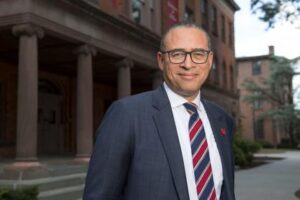 Jonathan Holloway, a U.S. historian, took office as the 21st president of Rutgers, The State University of New Jersey, on July 1, 2020. He also serves as a University Professor and Distinguished Professor.Prior to accepting the presidency of Rutgers, Dr. Holloway was provost of Northwestern University from 2017 to 2020 and a member of the faculty of Yale University from 1999 to 2017. At Yale, he served as Dean of Yale College and the Edmund S. Morgan Professor of African American Studies, History, and American Studies. President Holloway’s scholarly work specializes in post-emancipation U.S. history with a focus on social and intellectual history. He is the author of African American History: A Very Short Introduction and The Cause of Freedom: A Concise History of African Americans (Oxford University Press, February 2023 and February 2021, respectively). He also published Confronting the Veil: Abram Harris Jr., E. Franklin Frazier, and Ralph Bunche, 1919-1941 (2002), and Jim Crow Wisdom: Memory and Identity in Black America Since 1940 (2013), both with the University of North Carolina Press. He edited Ralph Bunche’s A Brief and Tentative Analysis of Negro Leadership (New York University Press, 2005) and coedited Black Scholars on the Line: Race, Social Science, and American Thought in the Twentieth Century (Notre Dame University Press, 2007). He wrote the introduction for the 2015 edition of W.E.B. Du Bois’s Souls of Black Folk (Yale University Press), and is working on a new book, A History of Absence: Race and the Making of the Modern World.
Jonathan Holloway, a U.S. historian, took office as the 21st president of Rutgers, The State University of New Jersey, on July 1, 2020. He also serves as a University Professor and Distinguished Professor.Prior to accepting the presidency of Rutgers, Dr. Holloway was provost of Northwestern University from 2017 to 2020 and a member of the faculty of Yale University from 1999 to 2017. At Yale, he served as Dean of Yale College and the Edmund S. Morgan Professor of African American Studies, History, and American Studies. President Holloway’s scholarly work specializes in post-emancipation U.S. history with a focus on social and intellectual history. He is the author of African American History: A Very Short Introduction and The Cause of Freedom: A Concise History of African Americans (Oxford University Press, February 2023 and February 2021, respectively). He also published Confronting the Veil: Abram Harris Jr., E. Franklin Frazier, and Ralph Bunche, 1919-1941 (2002), and Jim Crow Wisdom: Memory and Identity in Black America Since 1940 (2013), both with the University of North Carolina Press. He edited Ralph Bunche’s A Brief and Tentative Analysis of Negro Leadership (New York University Press, 2005) and coedited Black Scholars on the Line: Race, Social Science, and American Thought in the Twentieth Century (Notre Dame University Press, 2007). He wrote the introduction for the 2015 edition of W.E.B. Du Bois’s Souls of Black Folk (Yale University Press), and is working on a new book, A History of Absence: Race and the Making of the Modern World.
Statement by Matthew Pinsker, Director of the House Divided Project
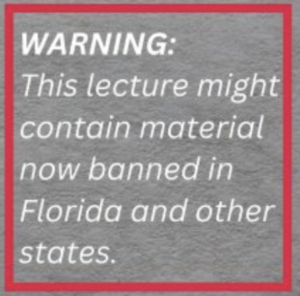 We put a “warning” label on Dr. Holloway’s lecture poster, because his presentation on African American history “might contain material now banned in Florida and other states.” Unfortunately, this was not intended as a joke. African American history is under assault across this country. Parents and students should always feel free to question and disagree with any academic theories or frameworks they encounter, whether it’s the 1619 Project, anti-racism, critical race theory (CRT) or something else. But passing state laws to ban books and criminalize teaching is never a good idea. Putting political pressure on the College Board to modify an AP curriculum is a mistake. We invited Dr. Holloway to come to Dickinson College and speak in front of Lincoln’s Gettysburg Address lectern so he could help explain to our students why African American history matters, perhaps now more than ever. We fully expect the evening’s discussion to be lively and thought-provoking, but also unifying and inspiring. “The Cause of Freedom” is one that every American –of any background or party affiliation– should strive to understand in all its dimensions.
We put a “warning” label on Dr. Holloway’s lecture poster, because his presentation on African American history “might contain material now banned in Florida and other states.” Unfortunately, this was not intended as a joke. African American history is under assault across this country. Parents and students should always feel free to question and disagree with any academic theories or frameworks they encounter, whether it’s the 1619 Project, anti-racism, critical race theory (CRT) or something else. But passing state laws to ban books and criminalize teaching is never a good idea. Putting political pressure on the College Board to modify an AP curriculum is a mistake. We invited Dr. Holloway to come to Dickinson College and speak in front of Lincoln’s Gettysburg Address lectern so he could help explain to our students why African American history matters, perhaps now more than ever. We fully expect the evening’s discussion to be lively and thought-provoking, but also unifying and inspiring. “The Cause of Freedom” is one that every American –of any background or party affiliation– should strive to understand in all its dimensions.
Material for Further Learning
- Yale Open Course on African American History with Prof. Holloway (2010)
- “DeSantis Defends Rejecting AP African American Studies, Says Its ‘Indoctrination,'” CBS News, Jan. 23, 2023
- Henry Louis Gates, Jr. “Who’s Afraid of Black History?” New York Times, Feb. 17, 2023
The J. Howard Wert Lecture is named in honor of J. Howard Wert (1841-1920), one of America’s great private collectors and pioneering educators. Wert was a young abolitionist and resident of Adams County, Pennsylvania who was present when Abraham Lincoln delivered his Gettysburg Address in 1863. The House Divided Project launched this annual lecture series in 2019 in partnership with the J. Howard Wert Collection and its current owner and curator, G. Craig Caba. Christy Coleman, former CEO of the American Civil War Museum in Richmond, Virginia, was the first Wert lecturer at Dickinson in 2019 to speak from the Gettysburg Address lectern. Noted Military historian Eric Wittenberg (Class of 1983) was the second Wert Lecturer in 2021. Rutgers University President Jonathan Holloway will offer the third annual Wert Lecture on April 15, 2023.
Background on the Collection
The J. Howard Wert Collection is considered one of the finest privately held collections of Civil War era artifacts in the country. Wert came from a prominent antislavery family in Adams County, Pennsylvania. The Wert family collected a number of important historical artifacts, dating back to the 18th century. Wert himself was a graduate of Gettysburg College who served as a scout for Union forces during the 1863 battle and was present for the Gettysburg Address later that year. Wert eventually enlisted in the Union army and became a teacher, author and noted school superintendent in Harrisburg. He died in 1920. During his lifetime, however, he was renowned for his collection of important historical artifacts. A 1910 newspaper profile claimed that Wert “had gathered a collection of relics at Gettysburg that could not be duplicated in any museum in the country.” In his own Gettysburg battlefield guide, which had been published in 1886 when he was forty-six years old, Wert wrote about how his collection of relics inspired him to try to recount the conflict for future generations:
As these lines are penned, from the walls around, cartridge-box and cap-box, bayonet and sword, canteen and canister, with a hundred other relics gleaned twenty-three years ago from the fields and woods we are now traversing, look mutely down upon the writer and vividly recall the sorrowful appearance of the bloated and distorted and blackened dead that lay close beside; noble, stalwart men were they, arrayed in garb of gray, who had bravely fought for what they deemed the right. (J. Howard Wert, A complete hand-book of the monuments and indications and guide to the positions on the Gettysburg battlefield, 1886, pp. 109-110)
Dedication Day, November 19, 1863
There are no eye-witness accounts or photographs from 1863 that actually depict the lectern or the chairs on the speaker’s platform. However, the photographs that do exist make very clear that the scene was more than a little chaotic and that most of the standing crowd would have had a limited view beyond the shoulder line of the speakers. Many of those present at the ceremony were impressed that the main orator Edward Everett seemed to have memorized his two-hour address, and some near the platform also remarked on how Lincoln slowly read his now much-more famous two-minute address, but few took note of other physical details from the platform itself. Yet, J. Howard Wert, then 22 years old, was definitely present at the ceremony. So was his friend, Henry Eyster Jacobs, a 19-year-old fellow graduate of Pennsylvania (later Gettysburg) College. His father, Michael Jacobs, was also there, and was at the time a professor at the college, writing a history of the battle. In fact, Prof. Jacobs had taken Everett on a tour of the battlefield in the days prior to the dedication ceremonies. We know this because Edwards himself mentioned the tour in his diary. Then, according to notes in the Wert Collection prepared decades later by J. Howard Wert, it was Professor Jacobs who provided his teaching lectern for the ceremony, along with at least one side chair, that was used by Everett, the former Massachusetts governor and U.S. senator while he was waiting to speak. These notes (previously unpublished), and various other relevant primary sources, including recollections by Wert and both Jacobs men, are provided below.
- Official select committee report & ceremony program (1864)
- Michael Jacobs book on battle (1864)
- Michael Jacobs article on touring battlefield: US Service Magazine with Part 2 (1864)
- J. Howard Wert battlefield guide (1886)
- J. Howard Wert recalling battle and cemetery dedication (1909): Part 1 and Part 2
- 1910 newspaper profile describing how Wert collected and annotated his battlefield relics
- Henry Eyster Jacobs on Gettysburg Address (1919)





